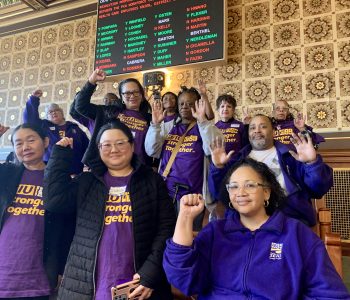 Connecticut
Connecticut
More than 100 long-term care workers blocked traffic in Hartford at the Department of Social Services to draw attention to the treatment of caregivers providing services in home care, group homes and nursing homes.
Workers gathered at the corner of Farmington Avenue and Flowers Street in demand of living wages and basic benefits like access to affordable health insurance, retirement options and paid time off. Workers also advocated for the state of Connecticut to find an effective solution to the critical staff shortages affecting the long-term care industry. All our demands are clearly noted in our proposals for a Long-Term Care Workers Bill of Rights.
“We do not make a living wage. We don’t even have health insurance to care for ourselves and our families when we get sick. And based on the governor’s proposed budget, we won’t get an extra penny or any new benefits for the next two years. They want us to go backwards,” said Angel Hawes, a personal care attendant from Ansonia. “I care for someone with physical disabilities, and I’m one of her lifelines. I’m a PCA because I care about people, and I love taking care of people. We’re asking for the basics: to not have to choose between paying rent and putting food on the table, to be able to take a day off work and go to the doctor when we’re sick, and to one day be able to retire with dignity.”
Most home care workers like Angel earn $16.25 an hour under the union contract with the state of Connecticut, without opportunities to access affordable health insurance, accrued paid time off or retirement options. Home care workers not covered by the union contract are often making bare minimum wage for their hard work. Workers like Angel and her peers in the long-term care sector should be making at least $20 per hour and be provided with basic benefits.
The undervaluation of long-term care work is evident in the lacking compensation structure for home care workers, and similarly so for workers in nursing homes and group homes that care for the elderly and people with disabilities.
“Group home workers across this state risked our lives this year to care for the most vulnerable people in Connecticut. We worked through a plague, caring for other people’s loved ones like our own, facing the deaths of our clients, our families, our coworkers, our friends. In spite of the care we gave, we still cannot afford basic necessities to care for ourselves,” said Amye Stoddard, a job coach at Journey Found who works 75 to 110 hours a week to make ends meet. “I love my job. I love that the work I do empowers the individuals to make their lives better. But this budget doesn’t care about us as healthcare workers, and it doesn’t care about the individuals we serve.”
Some group home workers are asked to pay monthly premiums as high as $5,200, as is the present case at Sunrise Northeast.
“If we were paid more and had better benefits, we wouldn’t have to work absurd amounts of hours to make ends meet and we could attract talented caregivers to fill vacancies we currently have,” Stoddard added. “My colleagues and I are overworked, we are stressed, and we are exhausted. Our lives do not matter less than the rich people in our state. I deserve to spend time with my daughter. I deserve to go to the doctor’s office without going into debt. I shouldn’t have to worry about feeding myself while I feed your loved ones. We need a budget that cares, and we won’t stop fighting until we get it!”
District 1199 New England, SEIU, represents nearly 20,000 long-term care workers in Connecticut. Long-term care is a labor sector of jobs that are predominantly held by women. A majority of our long-term care union workforce is Black and Brown. And we continue to risk serious illness and death on a daily basis so that vulnerable populations in Connecticut can receive critical health care.
Some 18 union long-term workers have paid the ultimate price due to COVID-19. Many more have lost loved ones or have suffered permanent damage from the virus. And thousands of long-term care patients and residents have suffered the same fate. Returning to normal is simply not an option.
Long-term workers have gone beyond the extra mile to continue providing services during COVID-19 at great risk to themselves and their families. Union workers will not rest until the long-term care system is fixed to pay livable wages, provide basic benefits and abolish the short-staffing practices that condemn us to perpetual poverty and desperation.
What: Long-Term Care Workers To Block Traffic
in Fight to Lift Themselves Out of Poverty
When: Wednesday, March 10 at 4:00 PM
Where: Department of Social Services
55 Farmington Avenue, Hartford
(Corner of Farmington Avenue and Flower Street)
Who: Union long-term care workers (home care, group homes
and nursing homes) and consumers, 1199 union leaders,
elected officials and community partners
Livestream:
Additional Media Coverage:







